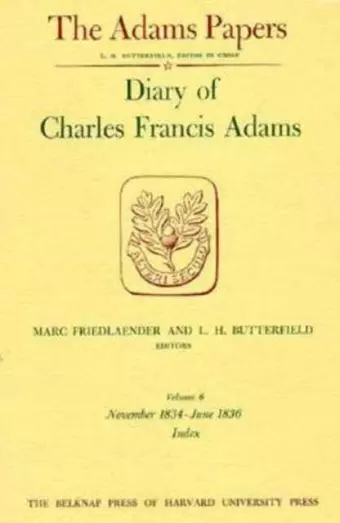Diary of Charles Francis Adams
Charles Francis Adams, Jr author Marc Friedlaender editor L H Butterfield editor
Format:Hardback
Publisher:Harvard University Press
Published:31st Jan '74
Currently unavailable, and unfortunately no date known when it will be back

A man’s twenty-seventh year is “critical,” according to Charles Francis Adams. And so his proved to be. Twenty-five at the start of these volumes, Adams had yet to embark on the public career that would mark him a statesman, but by their conclusion he had been drawn into the maelstrom of politics. It was an unwilling plunge, dictated by what both he and his father, John Quincy Adams, regarded as betrayal of the elder Adams by Daniel Webster and his Whigs. Once in, however, he showed himself politically adept.
This diary, kept from January 1833 to June 1836 and hitherto unpublished, has elements of hidden personal drama. Through private meetings and caucuses and newspaper articles signed with pseudonyms, the younger Adams found effective means to carry on political activities in the face of dilemmas posed by his father’s public prominence, his father-in-law’s contrary persuasions, and his own preferences. He emerged with growing self-respect and solid accomplishment as political journalist—his initial vocation.
The diary has fresh disclosures also about the personality of John Quincy Adams, shrewdly assessed by an observer uniquely placed to interpret domestic scenes as well as the greatly waged struggles in Washington against the Southern “slaveocracy” and “gag rules.”
Colorful figures in Boston’s political and social life are finely etched in outspoken appraisals characteristic of the Adamses. The diarist shows acuteness too in comments on books, sermons, paintings, the theater, and opera.
It is no attack upon these volumes to observe that the data they provide is rather low-keyed. But it is precisely because of the relatively quiet world the Diary portrays that another, perhaps equally important question is raised. It is the question of the Diary form - the peculiar aesthetic power which resides in the well-made journal. In this case, undistracted by the glitter of major historical events or novelistic renditions of personal crisis, the reader finds himself able to focus on the central experience of absorbing, entry by entry, the daily chronicle of a mans life. -- Robert F. Lucid * The New England Quarterly *
Most readers will find their fascination in the picture that Adams gives of an important American family and the life of one intelligent, highly individual member of it…The work is a solid and graceful achievement in scholarly publishing. Would that more of Charles Francis Adams could reach a general audience. His is one of the great diaries. -- William Bentinck-Smith * Harvard Magazine *
Although the editorial scholarship continues to be staggering…it never seems to be obtrusive, never unnecessary scholarship. The editors are the true heirs of an important part of the family tradition initiated by Charles Francis Adams: its legacy of selfless and creative editorial scholarship. -- Peter Shaw * American Scholar *
Adams wrote candidly and well about a wide range of subjects; the editors and publishers have made his writing available in the clearest possible form so that many may easily experience the particular delight of any outstanding diary the opportunity to see a man and his time through his own eyes and thoughts. * Baltimore Sun *
His crankiness makes his diary fascinating…In disliking and criticizing he describes, and thus shows us the texture of his daily life. The Adamses being who they were, their trivia are apt to be American history. * The New Yorker *
The effect is rather that of a vastly expanded novel about nineteenth-century upper-middle-class life. Adams had not yet entered his public career; the diary is thus almost entirely personal. And this is its appeal. It gives, as few other works do, a richness of texture, a feeling for the quality of life, and a sense of the relationship of people to each other which is invaluable for the American historian. -- Page Smith * Journal of American History *
ISBN: 9780674204027
Dimensions: 254mm x 171mm x 79mm
Weight: 2313g
942 pages